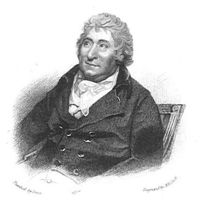Annotation:Blind Sailor (The)
X:1 T:Blind Sailor, The M:C L:1/8 R:Air Q:"Slow" C:”by (Charles) Dibdin” (1745-1814) B:Aird – Selection of Scotch, English, Irish and Foreign Airs, vol. 4 (1796, No. 184, p. 69) Z:AK/Fiddler’s Companion K:D f2|f2e2 a3a|f4d2d2|e2f2g2 fe|d4 c2a2|b2a d'2d'2| d'4 f3f|b4 e3d|c4 z2f2|f2e2a3a|f4d2d2|e2d2e2d2| g4-gfed|c2e2a2g2|fa d'2 !fermata!b2 ed|c2a2 {b}a2c2|{e}d4z2||
BLIND SAILOR, THE. English, Air (whole time). D Major. Standard tuning (fiddle). One part. A composition of English composer Charles Dibdin [1] (1745-1814), famous for his sea songs. "The Blind Sailor" was written for his play The Quizes, or A trip to Elysium (1792), and begins:

Come, never seem to mind it,
Nor count your fate curse,
However sad you find it,
Yet somebody is worse.
In danger some must come off short,
Yet why should we despair.
For if bold tars are Fortune’s sport,
Still are they Fortune’s care.

